Published Oct 04, 2025 | 9:00 AM ⚊ Updated Oct 04, 2025 | 9:00 AM

Kerala Congress seeks intervention from national leadership to restore relations with NSS.
Synopsis: Political alliances in Kerala are banking on the support of religious groups ahead of the crucial 2026 Assembly polls. The Congress-led UDF is striving to repair its ties with the NSS, with the Muslim League also stepping in for support. The move can be seen as an attempt to counter a shift of a section of the state’s electorate towards the BJP.
For weeks now, Kerala’s political chessboard has been alive with crucial moves. With only around seven months left for the Assembly elections, the Congress is carefully working to repair its strained ties with the Nair Service Society (NSS), with senior leaders PJ Kurien and Thiruvanchoor Radhakrishnan already meeting NSS General Secretary G Sukumaran Nair.
The Indian Union Muslim League (IUML) has stepped forward too, signalling its readiness to mediate if needed, its state president, Panakkad Sayyid Sadiq Ali Shihab Thangal, openly acknowledging the stakes. Above all, the Congress high command is stepping in, with the All India Congress Committee (AICC) getting ready to initiate direct talks with the NSS.
Why does so much revolve around the NSS? Why is the Muslim League willing to intervene? The answers lie not just in open alliances but also in shadow strategies, with the BJP quietly setting its own pieces on the board.
The political game in Kerala is no longer black and white — what unfolds now will be decided in several grey shades.
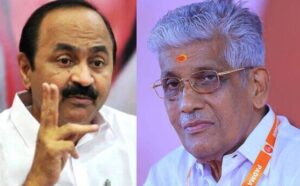
VD Satheesan and NSS General Secretary G Sukumaran Nair.
The NSS holds the key to Congress’s future in Kerala politics. With its headquarters in Perunna in the Kottayam district and more than 5,400 karayogam (Branch units) spread across the state, the organisation represents over 12 lakh members of the influential Nair community.
In central and southern Kerala, particularly in Thiruvananthapuram, Alappuzha, Pathanamthitta, and Kottayam, NSS wields significant clout. These four districts together send 37 MLAs to the Assembly, and they are considered the NSS turf.
For Congress, the numbers tell the story. In the 2021 Assembly elections, the party won only 21 seats, managing just four out of the 37 seats in NSS strongholds. It later added one more seat in the 2025 Nilambur by-election, bringing its tally to 22 — still the same number it had in 2016.
To achieve the UDF’s ambitious goal of 100 seats in 2026, as Leader of Opposition in Kerala Assembly VD Satheesan has projected, Congress will need a remarkable turnaround in the NSS-dominated districts.
The stakes are high. In 2001, Congress alone won 63 seats — such a comeback is possible only if it regains the trust of powerful community organisations like the NSS. But the challenge is tough. The BJP already has a foothold in over 2,500 karayogam, leaving Congress to compete for the remaining half of the NSS base.
With the responsibility of consolidating Hindu and Christian votes now squarely on its shoulders, Congress cannot afford to have NSS on the opposite side.
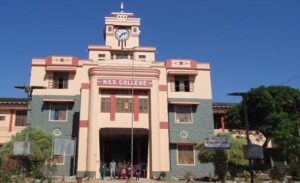
NSS College, Pandalam
After NSS General Secretary G Sukumaran Nair took a pro-LDF stance, the key question in Kerala is whether the community will follow his word at the ballot box. The answer lies in the NSS’s reach — running 164 schools, 24 colleges and several hospitals, it directly shapes the lives of thousands.
Dr Induchoodan, president of the Edappally Karayogam in Kochi, told South First that many community members are employed in NSS institutions, and many are students there. “Naturally, Sukumaran Nair’s stand influences them when they step into the voting booth,” he added.
This influence has drawn the BJP closer to the NSS, with leaders insisting their plans are not impossible dreams but calculated moves. Union Home Minister Amit Shah, while launching the local body election campaign in Kerala, directed workers to expand the party’s base across the state’s 1,200 local governments, which include 941 Grama Panchayats, 152 Block Panchayats, 14 District Panchayats, 87 Municipalities and six Corporations.
BJP Kerala Secretary A Nagesh Parameswaran told South First that Shah has asked the party to target 25 percent of the vote share in the upcoming polls, pointing out that they had already secured 18 percent in the last Lok Sabha elections.
The party’s immediate aim, he said, is to capture at least two corporations, Thrissur and Thiruvananthapuram, along with municipalities such as Palakkad, Pandalam, Guruvayoor and Kodungalloor, which have shown favourable voting patterns in previous elections.
Citing the BJP’s rise in West Bengal as a model, Parameswaran argued that Kerala too could see a similar shift, noting that many people, including NSS members, who once feared admitting support for the BJP now openly do so.
“You can label BJP as communal, but in the past decade, has there been even one corruption charge against our national leadership?” he asked.
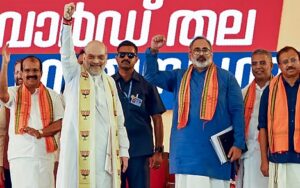
Amit Shah launches BJP’s local body poll campaign in Kerala
Nagesh told South First that they are working tirelessly on membership campaigns ahead of the local body elections. He said their current focus is on securing the maximum possible vote share in these elections, which would make campaigning for the upcoming Assembly elections much easier.
When South First spoke to Nandagopan S, a political researcher from Kochi, he said that the BJP has a long-term plan for Kerala. By 2031, they aim to become a major player, and by 2036, there are real chances of them forming a government.
“Their growth here has been slow but steady, and the days of mocking or ignoring them are over. The 2026 elections will make this clear. The BJP has quietly supported the LDF this time, allowing them to win so that Congress in the state is pushed into a coffin,” he said.
“That would set up the next phase as a direct battle between the LDF and the BJP, with the latter emerging as the main Opposition. From there, capturing power in 2036 won’t be a difficult task for them,” he said.
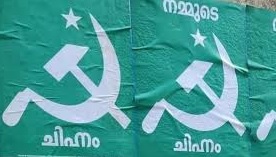
CPI(M) used green posters in Malabar during the previous elections.
The second-largest player in the UDF is the Indian Union Muslim League (IUML), which currently has 15 members in the Kerala Assembly. The party has considerable influence in parts of northern Kerala, particularly in Malappuram and Kozhikode, which together account for 29 Assembly seats.
IUML State General Secretary PMA Salam clarified on 1 October that there is no issue between NSS and the UDF. So why is IUML involved in this matter? The answer is simple- fear of a UDF loss. The party leadership could not ignore complaints from the ground.
When South First spoke to a Muslim League leader from Malappuram, he said on condition of anonymity that, for the past decade, the UDF has been out of power, which has negatively affected the performance of IUML MLAs.
Delays in projects, funding struggles, and reduced influence impact their work and could have electoral consequences. “How long can a political party continue without power?” he asked.
Two years ago, the then-state president of the BJP, K. Surendran, predicted that the IUML might soon join the LDF. The statement came after IUML chief Sayyid Sadiq Ali Shihab Thangal welcomed remarks CPI(M) State Secretary MV Govindan, terming the party “non-communal”.
CPI(M) invited IUML to events on issues such as the Uniform Civil Code and Palestinian support, hinting at political shifts. After the Lok Sabha elections, CPI(M) meetings revealed that some Muslim League leaders were open to joining the LDF to counter the BJP’s growth in the state.
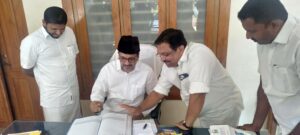
IUML’s Kerala unit president Panakkad Sayyid Sadiq Ali Shihab Thangal. (Najeeb Shah)
Is such a shift really impossible? It can’t be completely ignored, considering that the LDF first came to power in Kerala in 1967 as part of the Seven-Party Front, which included CPI(M), CPI, IUML, and four other parties — showing that the Muslim League has a history of alignment with the left in Kerala politics.
One of the most important political statements last week, though widely ignored, was made by Govindan, who said IUML is now leading the UDF.
This could have a major impact on the majority votebank, especially considering G Sukumaran Nair’s recent remark questioning why Congress even needs NSS votes when it already has Muslim support.
In Kerala politics, even the smallest moves can be crucial; sometimes the pawns and bishops decide victory or defeat.
(Edited by Muhammed Fazil.)

